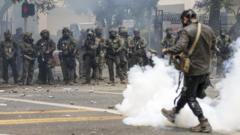In a recent Oval Office address, President Trump reiterated his commitment to Federal Reserve Chair Jerome Powell while urging for quicker interest rate cuts to bolster the economy, amidst ongoing trade tensions with China.
Trump Affirms Confidence in Fed Chair Powell Amid Rate Cut Demands

Trump Affirms Confidence in Fed Chair Powell Amid Rate Cut Demands
President Trump expresses faith in Jerome Powell but calls for more aggressive monetary policies
Trump, who previously nominated Powell, declared he has "no intention of firing" the Fed chief, regardless of his past critiques, which included labeling Powell a "major loser." While expressing optimism about improving trade relations with China, the president noted he would prefer a more proactive stance from Powell regarding interest rate adjustments.
The statements followed a period of market turmoil triggered by Trump's harsh remarks, leading to a selloff across stocks, bonds, and the US dollar. Recently, markets have shown signs of recovery, buoyed by positive economic sentiments and potential diplomatic easing with Beijing.
Despite Trump’s desire for a reduction in rates, the Fed has maintained its approach without cuts so far this year, raising questions about the boundaries of presidential influence over the central bank. Trump hopes for a "very nice" negotiation with China that would see tariffs decline, albeit not to zero. In response to the ongoing trade conflict, there are concerns regarding inflationary pressures due to these tariffs.
Amidst these dynamics, global economic forecasts have been downgraded by the International Monetary Fund (IMF), indicating that escalating trade tariffs may significantly slow down growth internationally. With the US imposing aggressive tariff rates—up to 145% on Chinese imports—China has retaliated with its own levies, adding to the escalating trade war narrative. The Chinese government has yet to officially respond, but media commentary suggests a recognition of the adverse impacts these tariffs could have on the US economy.
The statements followed a period of market turmoil triggered by Trump's harsh remarks, leading to a selloff across stocks, bonds, and the US dollar. Recently, markets have shown signs of recovery, buoyed by positive economic sentiments and potential diplomatic easing with Beijing.
Despite Trump’s desire for a reduction in rates, the Fed has maintained its approach without cuts so far this year, raising questions about the boundaries of presidential influence over the central bank. Trump hopes for a "very nice" negotiation with China that would see tariffs decline, albeit not to zero. In response to the ongoing trade conflict, there are concerns regarding inflationary pressures due to these tariffs.
Amidst these dynamics, global economic forecasts have been downgraded by the International Monetary Fund (IMF), indicating that escalating trade tariffs may significantly slow down growth internationally. With the US imposing aggressive tariff rates—up to 145% on Chinese imports—China has retaliated with its own levies, adding to the escalating trade war narrative. The Chinese government has yet to officially respond, but media commentary suggests a recognition of the adverse impacts these tariffs could have on the US economy.





















